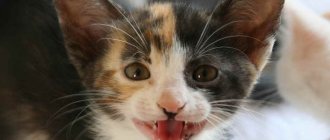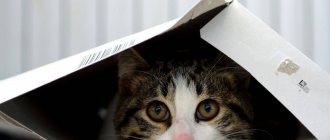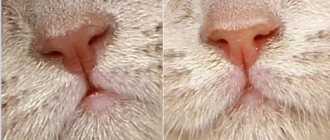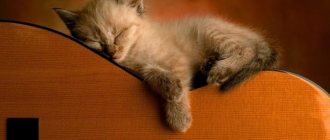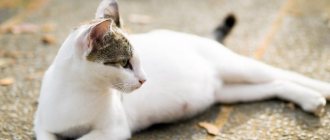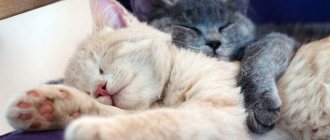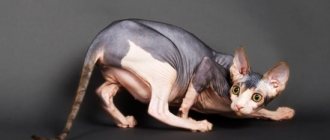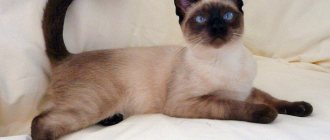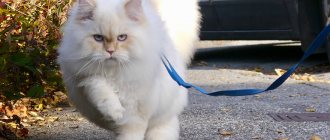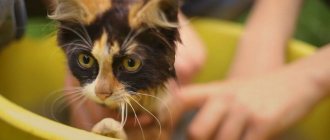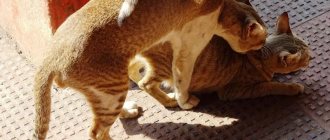Why do cats sniff your face while you sleep?
We were all shocked when we woke up to the touch of a cold nose on our cheek. When we open our eyes, we find our cat sniffing our face. It's a rude awakening made even more confusing by the cat's inexplicable actions. Why do cats sniff our faces while we sleep?
Cats sniff us partly to check how we are feeling. With a cat's sense of smell, we can tell a lot about our status by smell. A cat can:
- immediately determine whether we are injured or sick
- Find out the degree of our emotional state
- understand who or what we have recently been in contact with by smell.
- Your cat can also tell if her own scent marks are fading on you.
As for why our cats sniff our faces while we sleep, the most likely answer is ease of access. We tend to shy away from any object that comes close to our face that is beyond our control. Even if we adore our feline companions, we can still shy away when they get in your face. When a cat sleeps, it has the opportunity to sense our state.
How does this happen?
The fact is that cats have special odorous glands that secrete unique pheromones.
They are located in the cheek area, base of the tail, forehead, paw pads and anus. When a cat “rubs” against a person, thing or object, it literally turns on, uses its magic glands, and the unique smell remains for a long time where it was left. It’s interesting that the cat herself knows about this: you can notice how she moves her face with concentration and deep knowledge of the matter. This means that the message she left is long-lasting. We also advise you to take a closer look at how two cats who sympathize with each other behave. They “knock” their foreheads in the same way, and sometimes even intertwine their tails. At the same time, animals can purr sweetly and make other interesting sounds. When the cat leaves the room, its smell remains in the air for quite some time. So other pussies will quickly realize that the place is occupied or was occupied. Amy Shojai, a specialist whom we often refer to in our publications, regards “butting” as a way to consolidate territorial claims. With the small exception that with “territorial” marks, unique odors are usually applied to inanimate objects. And “butting” the owner is, rather, a great way to say: “You are only mine and no one else’s.”
• The person has health problems.
When a person has problems with some organ, his temperature begins to rise. The cat immediately finds this place and tries to lie down on it, because it is warmest there. Some even believe that a cat heals a person with its positive energy or completely takes away his illness.
In any case, you should pay attention to your health if your pet is trying to climb onto a certain part of the body.
But no matter how much the owners love their cats, they should not constantly carry them in their arms, press them to their faces or kiss them on the face, especially if the animal often walks outside the house.
After all, cats are carriers of skin, parasitic and infectious diseases that are transmitted to humans. Therefore, people need to carefully monitor the health of their cats, and if suspicious symptoms occur, immediately take the animals to the veterinarian.
Small gifts in the form of killed animals
Often cats, especially those that live in rural areas and have constant access to the street, bring killed mice, lizards or other small animals to their owners
At the same time, owners mistakenly believe that pets, behaving in this way, are trying to curry favor with them, showing their importance and significance.
2021 Nissan Kicks: Tough Design and New Equipment for Less
“Fluffy” fat is needed, but in small quantities. 4 types of fat and how to lose them
Roast Chicken and Other Dishes You Can Make with Leftover Champagne
In reality everything is different and much more touching. Domestic cats, no matter what dog breeders say about their character, become quite strongly attached to their owners. As a result, they bring killed small animals for them to feed, because they see that a person himself cannot catch a mouse or a lizard for dinner. This is how cats show their care for their owners.
Cat Body Language: Basic Secrets
In addition, you should monitor the cat's body position, which can also express your pet's emotions. So, a straight back and a raised head indicate that a cat is relaxed, but also attentive. If the cat sits a little sideways, this indicates that he is scared. A grinning and angry cat is about to attack from the front, and if he suddenly crouches down on the ground with a gloomy look, it means he has changed his mind about doing it.
In a similar way, you can interpret the signs that a cat gives with its eyes. A cat's attention is expressed by a direct and open gaze directed directly at you. At the same time, if the cat stares at you too openly, this expresses a challenge and a requirement to keep your distance. If the eyes are half-closed, the cat is cautious, and if they become like narrow slits, the cat is confident and wary. You should also be careful if the cat has round pupils and a crazy look - this expresses the animal’s fear, in which it cannot control itself. But if a cat looks at you, crouched to the ground, there is no danger, he is simply expressing devotion.
Finally, cat sign language also involves communication using their paws. If your cat rubs his paw against you or gently massages your hand with it, he is showing satisfaction and contentment. If a cat pulls at clothes with its paw or even fights, it means it is asking for something, including love and affection.
But the most powerful demonstration of love is a hug with paws. Also, a very strong emotion is expressed when a cat lies on its back - if it exposes its stomach to you, it means it completely trusts and loves you, so in this position you should definitely stroke and caress it - the cat will be very grateful to you!
If an animal bites or scratches you, it means that the animal is attached to you.
Gentle purring with squinting eyes, always only for the owner.
If a cat rolls from side to side and shows his belly, then he trusts you recklessly.
If a cat butts and pushes with its head, this expresses love for the person.
Trampling with paws on the owner’s body is complete trust.
Gifts brought for you: a strangled mouse or a caught bird - the cat adores you and is ready to give you everything.
If the cat lies down on its lap, the animal loves and trusts the person.
A long, squinting cat gaze can be interpreted as a declaration of love.
Presents his fluffy butt to the owner - demonstrates love and trust. (Kittens always turn their backs to their mother when they meet).
Meows at you - wants to talk or asks for food. A fluffy tail raised up is a joy from meeting you.
Biting hands - adoration. Cats mark things, sharpen their claws on furniture and wallpaper - they are comfortable and safe in the house. It is useless to scold or punish a cat for this, he does not understand why he is being scolded, he needs to be weaned differently.
Sucking clothes, blankets, and so on - the kitten was separated from its mother early, it is better to take the kitten when it is 2.5 - 3.5 months old.
The cat's tail is straight, its fur is bristling - it is frightened, tense and preparing to repel the attack.
The tail is slightly raised, hitting the sides - the cat is irritated and wants to leave
The tip of the tail is trembling - interest.
The tail moves frequently, but not much, from side to side - friendliness, joy.
Attacks the legs or arms of a lying owner, attacks from around the corner - calling to play with him.
Such games cause pain to the owners of young kittens. Kittens do not yet know how to control their claws and teeth and bite and scratch very painfully. Play with a kitten with a ball or a regular piece of paper on a string and the kitten will stop throwing itself at your legs and arms.
Evening running around the apartment - all cat breeds are nocturnal and sleep during the day. This is why cats naturally have an evening/night burst of activity and a burst of energy.
The ears stand vertical to the skull - the cat is curious.
He spreads his ears to the sides, pressing them to his head, inviting him to play.
He dropped his ears to the bottom - he was sick, upset, guilty.
Purrs softly and quietly - a feeling of satisfaction, a good mood. He growls loudly in his gut - he is offended, dissatisfied, complaining.
He screams loudly and protractedly - something hurts, asks for help. Wildly, furiously screaming - scared, angry.
Loud, rough purring is the highest pleasure. A plaintive purr means pain, poor health.
Hissing is a warning of an attack. Grumbling, with a howl - the female is in heat. A soft purr made by a mother cat is a warning to kittens.
The loud purring of the mother cat is a reaction to people approaching the kittens.
A cat licking you is quite normal, you are a member of his feline family.
Cats also love to lick places where humans sweat. Most likely, cats do not have enough salt.
Fluffy sleeps a lot - the animal is not sick, as some owners think, cats can sleep up to 20 hours a day. The cat immediately takes your place as soon as you get up - he wants to show you his superiority over you. Move it to another location.
The cat drinks water from the toilet - the water in the toilet is constantly renewed, and it is fresher and tastier than in a drinking bowl that has stood for half a day.
The four-legged friend loves to drink water from the tap - for him it is not only to quench his thirst, but also to play and hunt. And the sound of dripping or flowing water arouses great interest among cats.
Walking on tables is a favorite pastime of cats; they are exploring a new territory, and if there is a tasty treat there, the cat will be doubly pleased, but the kitten needs to be weaned off this as early as possible. I weaned it quickly - I laid a rustling film on the table, and at the very first jump the cat was so scared that now not only does it not jump on the tables, but when it hears any rustling of the package, it runs away in fear. The cat climbed into a bag or bag - the desire to find something tasty, this is inherent in your pet by nature. But if the cat stops showing interest in the owner’s bags, then either she is full or is depressed.
He buries his poop intensively - this indicates the cat’s cleanliness. It also means an instinctive action - so that other animals do not find the cat by smell.
The cat throws off various objects - hunts and plays.
The cat hides in a secluded place and does not respond - this is a natural desire to retire and be in peace and quiet. We, too, sometimes get tired of the hustle and bustle.
The cat constantly begs for food - it's your fault. Apparently one day you succumbed to her persuasion, pitying look, pleading meow. Now the cat will beg constantly.
A cat buries and hides food - this is a natural instinct; this is how supplies are made just in case, or the cat does not like the food.
The cat moves, twitches, runs in its sleep, twitches its tail, bares its teeth - it has been scientifically proven that cats dream, so perhaps she dreams that she is catching prey or running away from predators.
The cat constantly licks itself - this indicates cleanliness and the desire to preserve its own smell - the cat’s rough tongue stimulates the work of the endocrine glands, which are responsible for the release of a specific cat’s smell.
A cat chews wool balls - it’s one thing when a cat plays with a ball, but if he starts eating, gnawing, tearing threads - this is a manifestation of aggression. The cat is lying on the aisle - it shows who is boss in the house, it is better not to go around and coo with the cat at this moment, but to drive it away from the place and pass, otherwise the cat will then sit on your neck. Or, if you are a gentle person, move the cat to another location.
Cats love to lie down on clean linen - they are so clean, they love the smell of washed things, although they themselves may be dirty at that moment. All that remains is to hide the clean linen immediately in the closet. The cat is offended - he turns away, sits with his back to you, does not respond to your call, or goes into your slippers instead of the tray. Do you remember how you offended your friend? They pushed him and didn’t play with him? There can be many reasons for resentment - cats are touchy by nature.
The cat lay down on the computer or keyboard - it’s either warming up or wants to play and took over your workplace so that you would pay attention to it.
Of course, each cat is individual and you need to observe its habits yourself. And even then it is impossible to say with certainty - I know my cat 100%.
How to understand the language of cats?
It's not difficult at all, the main thing is to have a little observation. The main group of gestures is associated with a procedure such as licking. It means not only the desire to wash, it is a kind of language of cats, with the help of which they can demonstrate:
- confusion - the cat begins to lick itself when it was scolded (this is the best time for communication with the animal and reconciliation!);
- good mood - the cat begins to lick the owner’s hand;
- search for affection - the cat carefully licks the owner’s hand and tries to climb onto his lap;
- boredom - the cat licks itself with overly prolonged, deep and intense movements: in this way she asks to caress her or play with her;
- readiness for training - the cat washes rationally and carefully and is able to accept several commands from the owner.
In addition to licking, a cat's tongue also involves all kinds of movements of the body and tail. The most common among them is friction against the owner’s legs. In this way, the cat expresses love and can also ask for something. If a cat rubs its muzzle against your face and nuzzles your cheeks or lips, this expresses the extreme degree of its love and appreciation.
As for the tail, it can be in several positions:
- flies up - the cat is excited, but not angry or scared;
- slightly lowered - the cat is slightly frightened or dissatisfied (for example, with its food), in this state it is better to leave it alone;
- lowered low - the cat is very frightened or unhappy;
- actively twitching - the cat wants to be alone (if only the tip of the tail is twitching, this is an extreme degree of concern for the animal);
- fluffed up - the cat is preparing to attack;
- squeezed between the paws - the cat is afraid.
The kitten squeaks. Why is the little kitten screaming?
Your kitten is nursing, but squeaks loudly very often. There are several reasons why a small kitten screams.
— If a small kitten squeaks, then first you need to check the baby’s palate. Gently pick up the kitten in your hands and hold it firmly but gently. Insert the tip of your finger into his mouth (preferably from the side) and look inside to see if there is a cleft? If not, great. But if you notice a cleft palate in your baby, take him to the veterinary clinic; an experienced veterinarian will immediately tell you whether the kitten’s cleft palate is compatible with life. Unfortunately, most often these babies are euthanized.
— A newborn kitten needs to be weighed constantly. Immediately after birth and every day until 2 weeks of age. Then you can do it less often.
After checking the palate, cock the kitten and check if it is gaining weight (at least 7 grams per day). It's good if everything is fine with your weight. But if the baby is not gaining weight, the cat may have little or no milk and the kitten is hungry. Start feeding your baby. This should be done after he has sucked the cat's breast. And control your weight.
You can watch the process of feeding a newborn Maine Coon kitten in this video.
— A kitten can scream if it’s cold. Place him on a heating pad while the cat is not around. Due to a decrease in body temperature, the kitten's sucking reflex may disappear and a hungry kitten will squeak.
— The kitten squeaks if the cat doesn’t lick him (doesn’t “pee, poop”). This happens if the cat is not experienced (firstborn) or something is bothering her (mastitis, endometritis, retained placenta). If the cat is inexperienced, you will have to care for the newborn yourself and at the same time try to teach the cat how to properly care for the baby. Using cotton wool and warm water, gently stroke the kitten to stimulate defecation and urination every 3 hours (before feeding). Some people find it helpful to spread sour cream or butter on the kittens' butts, then the cat begins to lick them with pleasure.
But if something is bothering the cat and she gets sick, then you will have to simultaneously care for the kittens and treat the mother. After recovery, the cat will take care of her kittens herself.
As you can see, there are many reasons why a kitten squeaks. A small kitten screams from hunger, from hypothermia, and from a bloated tummy, and sometimes you come across just very talkative babies who gain weight well, but love to scream.
In most cases, you can easily help the kitten, but sometimes the help of a qualified specialist is required.
Did you like the article and was it useful? Please share with your friends.
Other interesting articles on our website:
• Weak newborn kitten
• First vaccination for a kitten
• Where can I buy a kitten
• Vaccination against shingles
Comments
Milena Rozhdestvenska 04/20/2015 19:37 Indeed, everyone remembers how little kittens squeak. No one wonders why they squeak.
Update list of comments
Add a comment
Write a comment, enter your email and receive two interesting books about cats as a gift! Attention! Comments are moderated, links and spam are not published.
LiveInternetLiveInternet
Slava_Nska
all posts by the author Many people have cats, but not everyone knows that they can be understood by their movements and poses...
EARS ...stand upright - curiosity (“What is it?”) ...flat, laid back - flirting ... laid back, eyes squinting - impatience, request ... laid back, eyes widened - warning ("Don't touch, it will get worse!") ... pressed to the head - preparation for an attack (“Look out!”) ... pressed to the head, the tail makes circles - irritation (“I’m angry”) ... twitching back and forth - anxiety, reaction to the owner’s reprimand (“Something’s wrong...” )
EYES ...squinted - calmness or drowsiness ("All right") ...squinted, winks with one eye - friendly disposition and good mood ("Life is good and everyone is good") ...half-closed - friendly disposition, trust and affection ("You and I are friends" ) ...squinting eyes - peacefulness and calmness ... wide open - fear ("I'm afraid") ... open, constantly looking straight into the person's face - challenge ("Try, touch me!") pupils dilated - wariness, aggression ("I'm already angry" ) or attention and interest (“What is this?”) the third eyelid appears - illness or drowsiness
MUSTACHES ...lowered down - concern, sadness or illness (“Leave me alone”)
MOUTH licks lips with a satisfied look - pleasure from food (“It was very tasty”) quickly licks lips, looks intently at something - some concern, interest; confusion quickly licks the front paw - excitement, indecision chatters teeth - disappointment at the sight of inaccessible game or pointing at it when teaching kittens to hunt (“I see prey!”) silently opens its mouth wide - meowing in high tones inaccessible to human perception
HEAD ...quickly “bows” back and forth, at the same time can turn slightly from side to side - greeting other cats (“Hello cats!”) ... rubs against a person - love, devotion, a request for cuddles (“I love you”)
PAWS strokes a person with his paw - close affection, tenderness stretches his paw to the person’s face - a request for attention and affection tramples with his paws - strong love, a desire to please (“I love you”) scratches loudly with his claws - the desire to attract attention (“Look at me” ) raises one relaxed paw - difficulty in making a decision (“I don’t know what to do...”) raises one paw and shakes it - disgust (“Ugh, disgusting!”)
BACK arches its back - intimidation of the enemy, strong irritation and readiness for defense (“I’m coming at you!”)
TAIL ...set vertically (“pipe tail”) - greeting, pleasure (“Hello, I feel good, how about you?”) ...set vertically, tip down and relaxed - good mood (“Life is beautiful”) ...raised, the cat turned to the person backwards - trust and respect (“I respect you”) ...stretched out and motionless - preparation for an attack. ("Be careful!") ...lowered - fatigue ("I have no strength...") ...hanging motionless - disgust, disappointment ("I'm so tired of everything!") ...moving the tip - interest...moving quickly back and forth - irritation ("Now I I’ll get angry”) ... hits the ground - aggression or hunting excitement ... raised with a sharp and fast movement, back slightly arched - greeting (people or other cats) ... raised above the head during a walk - in a male: dominance in relation to other cats (“I This is the most important one!”)
POSITION sits, paws tucked, tail turned - calm observation, waiting “dances” (takes two front paws off the ground and quickly puts them back, paws straight and tense; after this it rubs against the person’s legs very often) - greeting the person the cat loves (“Hello, I like you”) sits in a “column”, the front legs hang down - interest in the surroundings, attentive observation (“I sit high, I look far away”), looks around intently and then carefully licks its fur - calmness (possibly feigned) ( “Everything is fine”) lies on his back with a thoughtful look - rest (“Do not disturb”) lies on his back with his paws outstretched, “showing his belly” - friendship, complete trust and an invitation to cuddle (“We are friends”) rolls on the floor - contentment, demonstration of one’s attractiveness (“That’s what I am!”)
these are our pets =) understand them and love them =)
SOURCE
Do cats do this on purpose?
“I think so,” continues Marilyn Krieger.
– Let’s not forget that expressing love is one thing, but opening your face and making it vulnerable is completely different. By “butting,” the cat opens up almost completely, confirming that it has boundless trust in its owner. I note that only happy and confident cats do this.” What to add? All cat owners know that their pets love to get under their feet, rub their soft sides, and wrap their striped tails around them. The decoding of this behavior model is identical: it is a friendly greeting, an expression of joy, and a sign of trust. And sometimes a friendly request.
Do you like it when a cat cuddles up to you? Great - you can reinforce this behavior pattern. It's simple: pet your pet back. Help him convey your scent. Take in the smell. You can't think of a better way to strengthen friendship!
Original: Why Do Cats Rub Against You? Author: Kellie B. Gormly. Source: catster.com Photo: kupimzdes.ru (from open sources).
Visual thinking and mind reading
Communication between cats mainly occurs at the level of mental images, supported by sounds and body movements. They invented a kind of slang for people, but they communicate with each other in their native cat language.
Cats have something like hypnosis and are even able to instill fear in their opponents. Cats can sometimes read the thoughts of their owners, because sometimes you don’t have time to think about the pet, and he’s already right there.
Cat owners have long known this ritual: when they enter the house, the tailed pet immediately runs out and begins to rub against the legs of its breadwinner. Some consider such actions to be a kind of greeting, others - an expression of the pet’s affection for its owner, and others think that this is how cats beg for food. In fact, such actions of animals are inherent in them at the biological level.
- Show all

